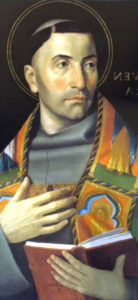Podcast: Play in new window | Download (Duration: 33:02 — 22.7MB) | Embed
Subscribe: Apple Podcasts | Spotify | Amazon Music | Android | Pandora | iHeartRadio | JioSaavn | Podchaser | Gaana | Podcast Index | Email | TuneIn | Deezer | Anghami | RSS | More
 Dr. Matthew Bunson discusses the life, times and teachings of St. Bonaventure pt. 1
Dr. Matthew Bunson discusses the life, times and teachings of St. Bonaventure pt. 1
-
Born: 1221, Bagnoregio, Italy
-
Died: July 15, 1274, Lyon, France
-
Education: University of Paris
From Vatican.va, an excerpt from the teachings of Pope Benedict XVI
From the General Audience on St. Bonaventure
St Bonaventure, in all likelihood born in 1217, died in 1274. Thus he lived in the 13th century, an epoch in which the Christian faith which had deeply penetrated the culture and society of Europe inspired imperishable works in the fields of literature, the visual arts, philosophy and theology. Among the great Christian figures who contributed to the composition of this harmony between faith and culture Bonaventure stands out, a man of action and contemplation, of profound piety and prudent government.
He was called Giovanni di Fidanza. An episode that occurred when he was still a boy deeply marked his life, as he himself recounts. He fell seriously ill and even his father, who was a doctor, gave up all hope of saving him from death. So his mother had recourse to the intercession of St Francis of Assisi, who had recently been canonized. And Giovanni recovered.
The figure of the Poverello of Assisi became even more familiar to him several years later when he was in Paris, where he had gone to pursue his studies. He had obtained a Master of Arts Diploma, which we could compare with that of a prestigious secondary school in our time. At that point, like so many young men in the past and also today, Giovanni asked himself a crucial question: “What should I do with my life?”. Fascinated by the witness of fervour and evangelical radicalism of the Friars Minor who had arrived in Paris in 1219, Giovanni knocked at the door of the Franciscan convent in that city and asked to be admitted to the great family of St Francis’ disciples. Many years later he explained the reasons for his decision: he recognized Christ’s action in St Francis and in the movement he had founded. Thus he wrote in a letter addressed to another friar: “I confess before God that the reason which made me love the life of blessed Francis most is that it resembled the birth and early development of the Church. The Church began with simple fishermen, and was subsequently enriched by very distinguished and wise teachers; the religion of Blessed Francis was not established by the prudence of men but by Christ” (Epistula de tribus quaestionibus ad magistrum innominatum, in Opere di San Bonaventura. Introduzione generale, Rome 1990, p. 29).
So it was that in about the year 1243 Giovanni was clothed in the Franciscan habit and took the name “Bonaventure”. He was immediately sent to study and attended the Faculty of Theology of the University of Paris where he took a series of very demanding courses. He obtained the various qualifications required for an academic career earning a bachelor’s degree in Scripture and in the Sentences. Thus Bonaventure studied profoundly Sacred Scripture, the Sentences of Peter Lombard the theology manual in that time and the most important theological authors. He was in contact with the teachers and students from across Europe who converged in Paris and he developed his own personal thinking and a spiritual sensitivity of great value with which, in the following years, he was able to infuse his works and his sermons, thus becoming one of the most important theologians in the history of the Church. It is important to remember the title of the thesis he defended in order to qualify to teach theology, the licentia ubique docendi, as it was then called. His dissertation was entitled Questions on the knowledge of Christ. This subject reveals the central role that Christ always played in Bonaventure’s life and teaching. We may certainly say that the whole of his thinking was profoundly Christocentric.
For more visit Vatican.va
Dr. Matthew E. Bunson is a Register senior editor and a senior contributor to EWTN News. For the past 20 years, he has been active in the area of Catholic social communications and education, including writing, editing, and teaching on a variety of topics related to Church history, the papacy, the saints, and Catholic culture. He is faculty chair at Catholic Distance University, a senior fellow of the St. Paul Center for Biblical Theology, and the author or co-author of over 50 books including The Encyclopedia of Catholic History, The Pope Encyclopedia, We Have a Pope! Benedict XVI, The Saints Encyclopedia and best-selling biographies of St. Damien of Molokai and St. Kateri Tekakwitha.



